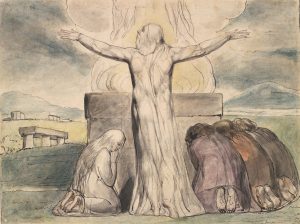Words on the Word
Job’s Insight
Homily given to a visiting group from the Bonifatiuswerk, which does so much to support our Catholic mission in the Nordic countries. You will find an English version by scrolling down
Hiob 19, 21-27: Meine Augen werden ihn sehen.
Lk 10, 1-12: Das Reich Gottes ist euch nahe.
Das Evangelium spricht von der Nähe des Gottesreiches. Was soll das heißen? Wo bleibt der verheissene Friede, die universelle Genesung, die Sättigung der Armen? Zu allen Zeiten war die bleibende Ungerechtigkeit der Menschheit mit der dazu gehörigen, uns alle treffenden schmerzvollen Angst ein skandalon für die Christen. Die Welt bleibt in Geburtswehen bis an das Ende der Zeit. Drin zu stecken kann nicht anders als traumatisch sein.
Die kollektive Erfüllung der göttlichen Gelübde entfaltet sich mit für uns unerträglicher Langsamkeit. Für Gott mögen tausend Jahre wie ein Tag sein. Für uns ist ein Tag halt ein Tag, und wir spüren sein Gewicht. Trotzdem sehen wir manchmal ein himmlisches Funkeln im Leben von Einzelnen, vielleicht sogar im eigenen Leben. So erzieht uns Gott. So lehrt er uns durch konkrete Erfahrungen Ewiges zu ahnen.
Der uns vorgelesene Abschnitt aus dem Buch Hiob ist ein Beispiel dieses Prozesses. Hiob hat alles verloren. Der erste Teil seines Buches ist ein bestürzender Klagegesang. Ein Realist ist Hiob. Er beklagt sich nicht wegen einzelner Verluste. Er weiss, das Leben eines Menschen ist fragil. Schmerz gehört dazu und lässt sich nicht immer erklären. Er drückt sein Leiden einfach aus, gibt ihm Form; verweigert sich aber stur gegen jede Versuchung, seine Qual als Gottverlassenheit zu betrachten. Er ist sicher, Gott sei irgendwie in allem und er will ihn dort erkennen.
Unser Text drückt eine entscheidende Wende in Hiobs Empfinden aus. Hiob ist genauso erbärmlich wie zuvor. Aber sein durchlebtes Leiden hat ihm gezeigt: keine menschliche Verwundbarkeit kann das mysteriöse Rettungswerk des Herrn hindern. Würde sich dieses Werk nicht später am Kreuz erfüllen? Im Voraus erlebt Hiob das christliche Paradoxon. Ein tragischer Träger des Todes erweist sich lebensspendend und verklärend. “Doch ich”, sagt Hiob, der geplagte, “ich weiß: mein Erlöser lebt” und wird sich als Letzter über meinem Staub erheben. “Meine Augen werden ihn sehen”, ob mein Fleisch sich nun zerfetzt: “Danach sehnt sich mein Herz in meiner Brust”.
Einen Durchbruch im Glauben und im Verständnis sehen wir hier. Licht im Dunkeln!
Und so ist es: manchmal können unsere Sinne die Wirklichkeit nicht bewältigen. Die Empirie kommt zu kurz. Nur die Sehnsucht deutet dann die Dinge wie sie wirklich sind und öffnet uns, lassen wir es zu, die Augen. Geschieht dies, kann sich das Gottesreich verwirklichen, verborgen aber höchst konkret, im Hier und Jetzt. So war es für Hiob. So kann es für uns sein. Meine Augen werden dann sehen, nicht ein anderer; und ich werde des Gesehenen Zeuge sein, zum Trost für die Menschen und zu Gottes Ehre. Amen.
***
Job 19, 21-27: My eyes shall see.
Luke 10, 1-12: The kingdom of God is at hand.
The Gospel speaks of the nearness of the kingdom of God. What’s that supposed to mean? Where, then, is the promised peace, the universal healing, the satisfaction of the poor? In every age, the remaining injustice of humanity with its consequent painful fear, which affects us all, has been a scandal for Christians. The world remains in birth pangs even unto the end of the age. To be stuck within them cannot but be traumatic.
The collective fulfilment of God’s promises unfolds with a slowness that is unbearable to us. For God a thousand years may be like a single day. But for us a day is a day, and we feel the weight of it.
Nonetheless we sometimes perceive a shimmer of glory in the lives of individuals, perhaps even in our own lives. That is how God educates us. That is how he teaches us to sense eternity in concrete experience.
The passage we have heard from the book of Job exemplifies this process. Job has lost everything. The first part of his book is an unbearable lament. Job is a realist. He does not complain about particular losses. He knows that human life is fragile. Pain is part and parcel of it, and cannot always be explained. He expresses his suffering, gives it form; but resists any temptation to consider his predicament proof that God has abandoned him. He remains convinced that God is in it all, and that is where he is determined to find him.
Our text represents a decisive turning-point in Job’s religious comprehension. He is just as miserable as before. But his suffered pain has taught him this: no human vulnerability can block the Lord’s mysterious work of salvation. Would this work not later be accomplished on the Cross? By anticipation Job lives through the Christian paradox. A tragic circumstance carrying death reveals itself life-giving and illuminating. ‘For I’, says Job, ‘I know that my Redeemer lives’ and that he will at last arise upon my dust. ‘My eyes shall see’, however cruelly my skin is now destroyed: ‘That is what my heart within my breast longs for.’
What we witness here is a breakthrough in both faith and understanding. Light in darkness!
That’s how it is: often enough our senses just cannot grasp the fullness of the real. Empiricism falls short. Only longing is then able to read and interpret things as they are in truth, opening our eyes – if we’re prepared to let it happen. When it does, the kingdom of God can in fact reveal itself, secretly but concretely, in the here-and-now. That’s how it was for Job. That’s how it can be for us. My eyes shall then behold, and not another; and I shall become a witness to that which I have seen, to God’s glory and to the comfort of mankind. Amen.

William Blake’s account of Job’s sacrifice, from the Morgan Library.
